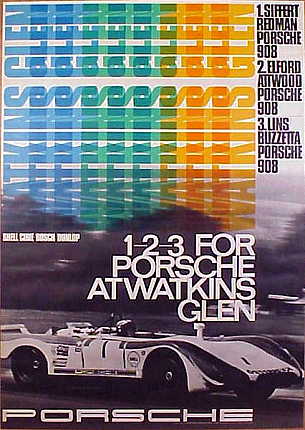|
Watkins Glen
Courtesy of theGlen.com
With its rise from ragged
infancy in 1948 to its position as America's
premier racing facility surely qualifies The Glen as
an astounding and unlikely success story, which
continues to be written fifty years later.
Law student Cameron
Argetsinger dreamed of bringing European style
competition to the village where he spent his summer
vacations and he drew up a challenging course that
encompassed asphalt, cement and dirt roads in and
around the village of Watkins Glen. The dream became
reality on October 2, 1948, "The Day They
Stopped the Trains", in the first post-World
War II road race in the U.S. For five years, the top
names in American sports car racing visited the
small village and huge crowds came out to watch them
race.
Competition moved to a
temporary course in 1953, and 2.3-mile permanent
circuit was built in 1956. The following year, The
Glen hosted its first professional race, a NASCAR
Grand National Stock Car event won by Buck Baker
over Fireball Roberts. True international
competition began in 1958 with the running of a
Formula Libre race.
The Formula 1 stars all
visited The Glen in 1961 for the first Watkins Glen
U.S. Grand Prix, which would be a fall tradition at
the circuit through 1980. Innes Ireland won the
inaugural running, with great drivers such as Clark,
Hill, Stewart, Lauda, Fittipaldi and Hunt among the
winners of later Grand Prix.
The circuit itself was
expanded in 1971, as the seventies brought a wide
variety of competition to The Glen, including the
Can-Am, Trans-Am, Six Hours, Formula 5000 and CART
Indy Car Series. Race winners included many of the
top names in international motorsports, including
Mark Donohue, Mario Andretti, Jody Scheckter and
Bruce McLaren.
Alan Jones' victory in
the 1980 United States Grand Prix at Watkins Glen
marked the close of an era. Financial difficulties
led to the Watkins Glen date being dropped from the
Formula 1 schedule and as a result, the bankrupt
track closed following a CART race in 1981. Over the
next two years the track fell into disrepair,
hosting only a few non-spectator SCCA weekends.
Corning Enterprises, a newly-chartered subsidiary of
Corning Glass Works, purchased the track in early
1983 and formed a partnership with International
Speedway Corporation forming Watkins Glen
International.
The Glen reopened on July
7, 1984, with Al Holbert, Derek Bell and Jim Adams
winning the inaugural Camel Continental at the
renovated facility. On August 9, 1986, fans
witnessed Tim Richmond's triumph at the return
of the NASCAR Winston Cup Series. The Bud at The
Glen grew to become New York State's largest
motorsports event and saw some of NASCAR's
finest take the checkered flag including, Martin,
Wallace, and in 1998, Jeff Gordon, won his second
consecutive Glen race before a record crowd.
In 1991, Terry Labonte won
the first NASCAR Busch Grand National race at the
Glen beginning an impressive streak of four wins in
six years, including three consecutive wins in
'94 through '96. His three year win streak
ranks him with other Watkins Glen three-time
winners: Formula One ace Graham Hill, SportsCar
drivers Al Holbert and Derek Bell and Winston Cup
driver Mark Martin.
1992 saw a major
reconfiguration of The Glen's back straightaway.
The addition of the Inner Loop increased the length
of the long course to 3.4 miles and the short course
to 2.45 miles. The new turns enhanced competition
while adding quality spectator viewing. The Glen
cemented its distinction as North America's
fastest road course when Davy Jones won the pole for
the Camel Continental IX with a fast lap of 150.334
mph on the reconfigured 2.45 mile short course.
In 1997, International
Speedway Corporation, whose holdings include Daytona
International Speedway, Talladega Superspeedway,
Darlington Raceway and Phoenix Int'l Raceway,
became sole owner of the historic road course,
exercising a stock option buy-out of Corning
Incorporated. The sale completed Corning's
mission of rebuilding the race track while
revitalizing the Southern Finger Lakes Region.
In addition to holding
major NASCAR and SCCA events, Watkins Glen
International also hosts one of the nation's
premier vintage events, the Zippo U.S. Vintage Grand
Prix. This event was the climax of the 50th
anniversary season, returning many of the original
cars and drivers to the original 6.6-mile street
circuit through the village during the Grand Prix
Festival Race Reenactment.
1998 saw a first time
combination event featuring the Lysol 200 NASCAR
Busch Series and the Bully Hill Vineyards 150 NASCAR
Craftsman Truck Series as the "Festival of
Speed and Sound" weekend at Watkins Glen
International. A weekend filled with great racing
and live musical entertainment.
In addition, Frontier
Corporation (now known as Global Crossing), a
nationally known communications, cellular phone and
electronic media company headquartered in Rochester,
New York, became the new sponsor of NASCAR's
biggest event in New York, The Frontier @ The Glen,
NASCAR Winston Cup event in 1999 for a three year
deal designed to showcase talented, cutting edge
competition on The Glen's historic course.
Watkins Glen International
celebrated the 50th anniversary of road racing in
Watkins Glen during the 1998 racing season.
Throughout fifty years of change, Watkins Glen has
embodied more than giant crowds and great speeds.
The racing community continues to return to Watkins
Glen for broader reasons. Watkins Glen has become a
racing institution, the premier road racing facility
in the United States.

Links:
Official Watkins
Glen site Schedule of events, history,
tickets
The
Watkins Glen Motor Racing Research Library
"Watkins
Glen Memories" Watkins Glen racing photos
and classic wooden boat photos
|

